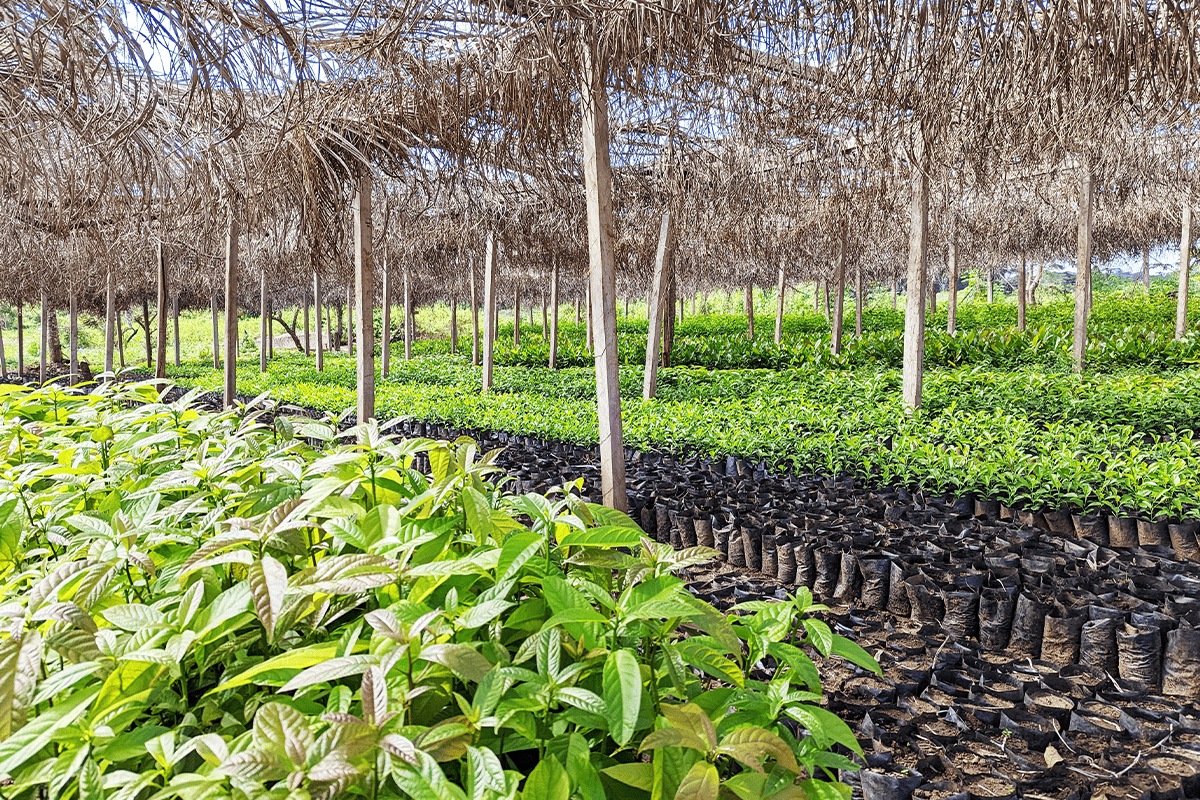Have you wondered why the demand for nature-based credits is skyrocketing? And, more importantly, what makes them such a force for good in the quest for a sustainable future? In this article, we will delve into nature-based credits and their demand, which are gaining significant traction in the environmental sphere. These credits offer a means to recognise and trade the invaluable services provided by nature, allowing us to address environmental issues, conserve biodiversity, and restore ecosystems. Join us on this informative journey as we examine the factors driving the escalating demand for nature-based credits and their potential implications.
 Bumble bee collecting a pollen from a blossom flower.
Bumble bee collecting a pollen from a blossom flower.
Understanding nature-based credits
Let’s start with unpacking the concept of nature-based credits. Think of the value of the fundamental services provided by nature, including clean air, potable water, carbon sequestration, and stunning biodiversity and landscapes. Nature-based credits enable us to quantify and exchange these benefits in various forms, such as carbon credits, biodiversity credits, and ecosystem service credits. By embracing nature-based credits, we establish a tangible framework to acknowledge and incentivise the preservation of natural resources.
Factors driving the demand for nature-based credits
Now, let’s explore the compelling reasons behind the surging demand for nature-based credits. These factors highlight the urgency and potential for using nature-based solutions as integral components of our environmental and climate strategies.
Firstly, increasing environmental crises necessitate intervention. Carbon emissions contribute greatly to climate change and rising temperatures, which result in environmental disasters. Nature-based solutions, including afforestation, reforestation and wetland restoration, can sequester large amounts of carbon dioxide and mitigate rising emissions. As global awareness of the climate crisis intensifies, the demand for carbon sequestration through nature-based credits has soared.
 Koala bear sitting on a branch, Australia.
Koala bear sitting on a branch, Australia.
A recently published academic paper, titled Estimating the potential of international carbon markets to increase global climate ambition, further reinforces the importance of international market cooperation and the inclusion of REDD+ (Reducing Emissions from Deforestation and Forest Degradation) in bridging the global emissions gap. Authored by Ruben Lubowoski, Pedro Piris-Cabezas, and Gabriela Leslie, the study reveals that implementing global emissions trading, with proper accounting rules and banking of emissions units, can significantly increase (and potentially double) climate ambition, particularly under Article 6 of the Paris Agreement, without increasing aggregate costs. It adds that REDD+ plays a crucial role in this context.
Secondly, the urgent need for biodiversity conservation and habitat restoration has gained substantial global prominence. With the alarming rate of species decline, nature-based credits offer a lifeline for preserving our delicate ecosystems. By safeguarding endangered species’ habitats and rehabilitating degraded lands, these credits promote the revival of biodiversity hotspots. Consequently, the demand for biodiversity-focused nature-based credits has surged, echoing the call for comprehensive environmental preservation efforts.
Read more: How the reforestation project in Uganda benefits the Bulindi chimpanzees
The aforementioned research also emphasises the critical role of prioritising REDD+ markets. It suggests that as global climate ambition intensifies, the inclusion of forests and other international markets becomes increasingly vital.
The research not only highlights the critical role of prioritising REDD+ markets but also aligns with the increasing global pressure to halt biodiversity loss, a topic of paramount importance addressed at the United Nations Biodiversity Conference (COP 15). This conference, attended by nations worldwide, serves as a platform to address the urgent need for biodiversity conservation and strengthen international commitments.
Thirdly, in addition to the environmental imperative, policy and legislation exert substantial pressure on companies and industries to embrace nature-based credits. Governments across the globe are enacting regulations and potential tax measures on both national and international levels, compelling businesses to take action. Companies increasingly recognise that investing in nature-based solutions and acquiring nature-based credits not only helps them comply with regulations but also contributes to their long-term sustainability strategies.
Lastly, societal, competitive, and customer pressures play a significant role in driving the demand for nature-based credits. Consumers are becoming more environmentally conscious and expect businesses to demonstrate their commitment to sustainability. Companies that actively support nature-based initiatives enjoy stronger brand reputations, a competitive advantage, and increased customer loyalty. By aligning their values with those of their customers, businesses can position themselves as leaders in the transition to a greener and more sustainable future.
 Tree nursery – Sawa Afforestation Project, Cameroon, DGB.
Tree nursery – Sawa Afforestation Project, Cameroon, DGB.
In this dynamic landscape, the rising demand for nature-based credits is propelled by a combination of factors, including the critical need to address climate changes, the global pressure to halt biodiversity loss discussed at COP 15, policy and legislation pressures, and the expectations of society and customers. Embracing nature-based solutions and investing in nature-based credits not only contributes to achieving net-zero goals but also demonstrates a commitment to environmental stewardship, enabling businesses to thrive in an increasingly sustainability-focused world.
Measure your environmental impact
Challenges and opportunities
As with any significant endeavour, nature-based credits face certain challenges and offer opportunities. Accurately measuring and verifying the effectiveness of nature-based projects can be a complex task. Establishing robust methodologies and standards is crucial to ensure project integrity and prevent instances of greenwashing. The development of reliable systems for tracking and verifying the environmental benefits provided by nature-based solutions is imperative.
Scaling up and standardising nature-based solutions represent additional hurdles. To maximise their impact, widespread adoption and consistency across sectors and geographical regions are paramount. Effective implementation of nature-based credits requires collaboration among governments, businesses, and communities. Only through unified efforts can we fully unlock the potential of these credits and create a greener, more sustainable world.
Amidst the challenges, nature-based credits offer significant opportunities for both businesses and the environment. These credits provide a tangible pathway for companies to align their operations with sustainability goals, fostering innovation and driving the development of nature-based solutions. By investing in nature-based projects, businesses enhance their environmental performance, reduce their carbon footprint, align with global trends, attract investors and customers, and contribute to biodiversity conservation.
 Toucan sitting on a tree branch, Brazil.
Toucan sitting on a tree branch, Brazil.
Nature-based credits also create avenues for collaboration and partnerships among stakeholders, including governments, NGOs, and local communities. Such collaborations foster knowledge exchange, shared resources, and collective action, amplifying the impact of conservation efforts.
Moreover, nature-based credits can generate economic opportunities, particularly in regions with abundant natural resources, by creating jobs and supporting sustainable livelihoods. The increased demand for nature-based credits also makes it an attractive economic investment as the market strengthens and prices for such credits rise.
These opportunities not only contribute to the success and resilience of businesses but also promote inclusive and equitable growth. Embracing nature-based credits unlocks a world of possibilities where environmental sustainability and economic prosperity go hand in hand.
Case studies: the high demand for nature-based credits
To gain a deeper appreciation for the potential of nature-based credits, let’s examine a few inspiring case studies.
One notable case of heightened demand for nature-based credits is the major carbon credits deal signed by the tech giant Meta. The deal, marked at 6.75 million carbon credits, represents a significant step towards fulfilling their net-zero emissions objectives. Meta recognises the value of nature-based credits in offsetting carbon emissions and supporting environmental projects that contribute to the removal of carbon dioxide from the atmosphere. Their partnership with Aspiration highlights the increasing recognition of nature-based solutions as a viable pathway towards a sustainable future.
Read more: Meta signs major carbon credits deal with Aspiration for nature-based solutions
Another note-worthy case is the record-breaking Nairobi auction, where over a dozen companies, primarily from Saudi Arabia, competed for 2 million carbon credits. These credits were generated through eco-friendly initiatives such as tree planting and adopting cleaner cooking fuel. The auction witnessed heightened demand for carbon offsets as companies strived to meet their net-zero emissions goals. Notable participants, including Saudi Airlines, recognised the importance of offsetting their emissions and actively engaged in the auction. This event underscores the market’s growing recognition of the significance of carbon credits and the willingness of companies to invest in natural climate solutions.
Read more: Record-breaking Nairobi auction: Saudi Arabian firms vie for 2 million tonnes of carbon credits
These examples highlight the practical implementation and market dynamics surrounding nature-based credits. As businesses increasingly embrace the need for sustainability, the demand for carbon offsets and nature-based solutions continues to rise. These case studies demonstrate how companies actively take responsibility for their environmental impact and engage in sustainable practices. By investing in nature-based credits, businesses offset their emissions and contribute to the development of environmental projects that support biodiversity, ecosystem restoration, and climate resilience. The growing market for nature-based credits reflects a global commitment to sustainability and the recognition of their instrumental role in achieving a low-carbon economy.
DGB Group continues to drive environmental change through nature-based credits
In conclusion, the escalating demand for nature-based credits is reshaping our environmental landscape. As governments, businesses, and individuals recognise the value of nature’s services, we are presented with an opportunity to harness their power for the betterment of our planet. Nature-based credits offer a promising framework to combat climate change, protect biodiversity, and restore ecosystems.
As a company dedicated to designing and implementing large-scale nature-based solutions, DGB Group is confident that nature-based credits hold the key to achieving a feasible net-zero future while simultaneously supporting our precious ecosystems. By harnessing the power of nature, we can unlock innovative solutions that not only address climate change but also promote biodiversity conservation. Through our high-quality nature-based credits, we can create a harmonious balance between human progress and environmental stewardship, leading the way for a sustainable and thriving planet for generations to come. Together, let us embark on a transformative journey, embracing nature-based solutions as a cornerstone of our environmental strategies.
Contact our experts to become sustainable and make a difference
- SEO Powered Content & PR Distribution. Get Amplified Today.
- PlatoData.Network Vertical Generative Ai. Empower Yourself. Access Here.
- PlatoAiStream. Web3 Intelligence. Knowledge Amplified. Access Here.
- PlatoESG. Automotive / EVs, Carbon, CleanTech, Energy, Environment, Solar, Waste Management. Access Here.
- BlockOffsets. Modernizing Environmental Offset Ownership. Access Here.
- Source: https://www.green.earth/blog/the-rising-demand-for-nature-based-credits



